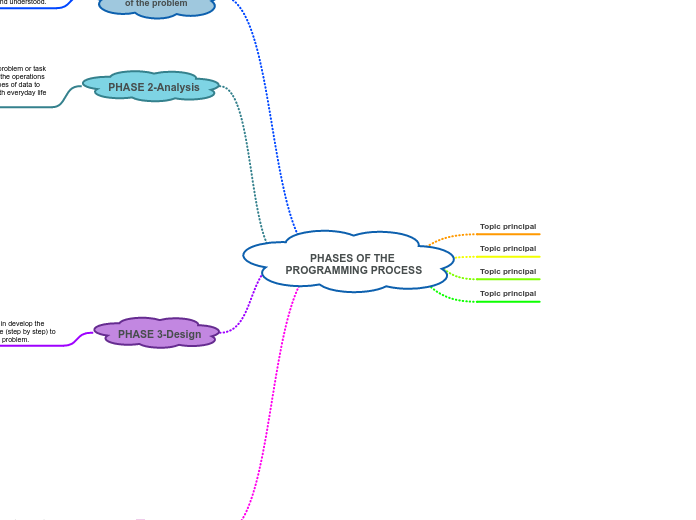PHASES OF THE PROGRAMMING PROCESS
Topic principal
Topic principal
Topic principal
Topic principal
PHASE 1-Definition of the problem
It is the phase in which the problem or task is clearly defined and understood.
PHASE 2-Analysis
To analyze point by point the problem or task that is presented, think about the operations necessary to solve it, the types of data to handle and the relationship with everyday life situations.
IMPUT
Data to be entered to solve the problem
PROCESS
Procedures where the input data is used to solve the problem
OUTPUT
The solution of the problem
PHASE 3-Design
Consists in develop the procedure (step by step) to solve the problem.
ALGORITHM
The algorithm can be defined as a set of logically ordered steps to carry out a given task or that describe the solution of a problem.
TYPES
Sequential
The steps are executed or de scribed from beginning to end without jumps
Conditional
They involve making decisions in some of the steps due to conditions or questions that lead to answering true or false, or to follow one path or another.
Cyclical
Are those where there are actions or steps that are repeated while or until a condition is met.
CHARACTERISTICS
-Have a beginning and an end.
-Have a finite number of steps.
-The steps must be logically ordered.
-The steps must be logically ordered.
FLOW DIAGRAM
The flow diagram is the graphical representation of an algorithm, it is one of the pro gramming tools that allows to visualize in a general way the development of the solution of a problem.
Blocks or template are used to the construccion
DESKTOP TEST
It consists of giving value to the variables in the flow chart and checking if the result obtained is as expected.
PHASE 4-Coding
It is the translation of the algorithm or flow chart into a programming language according to its grammar rules or syntax.
